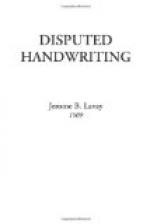Since typewriting has come so generally into use, the question often arises as to the identity of typewriting by different operators as well as that done on different machines. This may usually be done with considerable degree of certainty. Different operators have their own peculiar methods, which differ widely in many respects,—in the mechanical arrangement, as to location of date, address, margins, punctuation, spacing, signing, as well as impression from touch, etc.
The distinctive character of the writing done on different machines is usually determined with absolute certainty. With most machines there are accidental variations in alignment. Certain letters from use become more or less imperfect, or become filled or fouled with ink. It is highly improbable that any one even of these accidents should occur in precisely the same way upon two machines, and that any two or more should do so is well nigh impossible. It is equally certain that all the habits and mannerisms of the operators would not be precisely the same. A careful comparison of different typewritings in these respects cannot fail to determine whether they are written by the same operator or upon the same machine. It should be remembered that writing upon the same machine will differ in all the respects mentioned at different stages of its use and condition.
An immaterial alteration is one which does not change the legal effect or significance of an instrument. If what has been written upon or erased from the instrument has no tendency to mislead any person to the instrument, it will not be an alteration; it is immaterial also where the meaning is in no manner varied or changed.
The courts uniformly hold that an immaterial alteration should be treated as no alteration and therefore does not avoid the instrument.
Altering words in the instrument without changing the legal sense or altering immaterial words is an immaterial alteration.
Retracing a faded name with ink, or tracing a word with ink written with pencil, is immaterial.
Alterations and additions in deeds are immaterial where neither the rights or duties, interests or obligations, of either of the parties to the instrument are in any manner changed or affected.
A promissory note made payable to a partnership under a certain name was altered by the maker and the payee without the knowledge of the surety so as to be payable to the same parties under another name and the court held it to be immaterial.
But the effect of the correction must be that it makes the instrument conform to the intention of the parties concerned, nor must they alter the legal sense of the instrument. Memoranda made on the margin of the note for the convenience of the holder and merely explanatory of some circumstances connected with the note are immaterial. The erasure of words immaterial to the legal sense of the instrument or inserted by mistake, is also immaterial.




